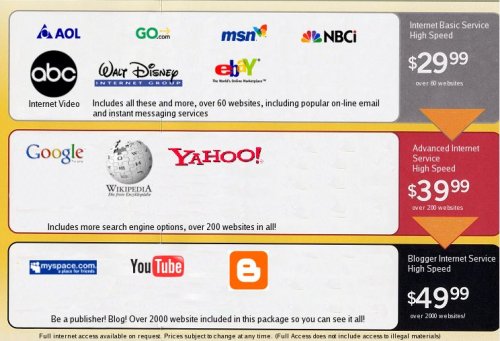A world without net neutrality: each program has its own tariff
Imagine a world where each program will have its own tariff plan. Want Facebook? Please, two cents per megabyte. Skype - anlim for a month for three euros. A few years ago it was perceived as a joke ...

... and now mobile operators are really exploring the technical possibilities for a new way to monetize traffic.
For example, here is a slide from a webinar , which on December 14 was arranged for mobile operators by the IP services optimization service Allot Communications and the billing operator Openet.
')

This is not a joke, but a real presentation.
This may be possible in the United States if regulatory agencies cancel the principle of net neutrality and allow cellular providers to control the traffic passing through them. From the point of view of the Federal Communications Agency (FCC), this is quite a reasonable proposal, because mobile operators do not already have enough bandwidth to let all traffic through. They need to obtain the right, for example, on shaping torrents in favor of their own VoIP-telephony.
Voting on the issue of network neutrality rules in the FCC is scheduled for December 21, 2010 . The position of the FCC chairman Julius Genachowski (Julius Genachowski) is approximately the following: “discrimination of traffic” in cellular networks cannot be avoided, but it must be “open” and “transparent” discrimination according to predetermined rules.
You can imagine what new monetization options are opening up to the ISP. For example, the “pirate web” tariff (access to torrents) is $ 70 per month or the “Internet for business” tariff (SSH and VPN protocols) is $ 120 per month. However, 90% of users will probably be quite the cheapest fare that gives access to Facebook, they don’t need anything else. If network neutrality is canceled, these users will benefit because the Internet will be cheaper for them.
Non-compliance with the principles of network neutrality is increasingly common in Russia, where cellular operators are beginning to provide “free” access to some web services, for example, Yandex.Maps. Of course, in this case, Yandex.Maps get a competitive advantage over Google Maps. Probably, if Google offers the operator a large amount of money, the “free access” will already be to their service. In fact, it turns out that Russian operators are already ready to take money from content providers for providing priority access to their sites.

... and now mobile operators are really exploring the technical possibilities for a new way to monetize traffic.
For example, here is a slide from a webinar , which on December 14 was arranged for mobile operators by the IP services optimization service Allot Communications and the billing operator Openet.
')

This is not a joke, but a real presentation.
This may be possible in the United States if regulatory agencies cancel the principle of net neutrality and allow cellular providers to control the traffic passing through them. From the point of view of the Federal Communications Agency (FCC), this is quite a reasonable proposal, because mobile operators do not already have enough bandwidth to let all traffic through. They need to obtain the right, for example, on shaping torrents in favor of their own VoIP-telephony.
Voting on the issue of network neutrality rules in the FCC is scheduled for December 21, 2010 . The position of the FCC chairman Julius Genachowski (Julius Genachowski) is approximately the following: “discrimination of traffic” in cellular networks cannot be avoided, but it must be “open” and “transparent” discrimination according to predetermined rules.
You can imagine what new monetization options are opening up to the ISP. For example, the “pirate web” tariff (access to torrents) is $ 70 per month or the “Internet for business” tariff (SSH and VPN protocols) is $ 120 per month. However, 90% of users will probably be quite the cheapest fare that gives access to Facebook, they don’t need anything else. If network neutrality is canceled, these users will benefit because the Internet will be cheaper for them.
Non-compliance with the principles of network neutrality is increasingly common in Russia, where cellular operators are beginning to provide “free” access to some web services, for example, Yandex.Maps. Of course, in this case, Yandex.Maps get a competitive advantage over Google Maps. Probably, if Google offers the operator a large amount of money, the “free access” will already be to their service. In fact, it turns out that Russian operators are already ready to take money from content providers for providing priority access to their sites.
Source: https://habr.com/ru/post/110137/
All Articles